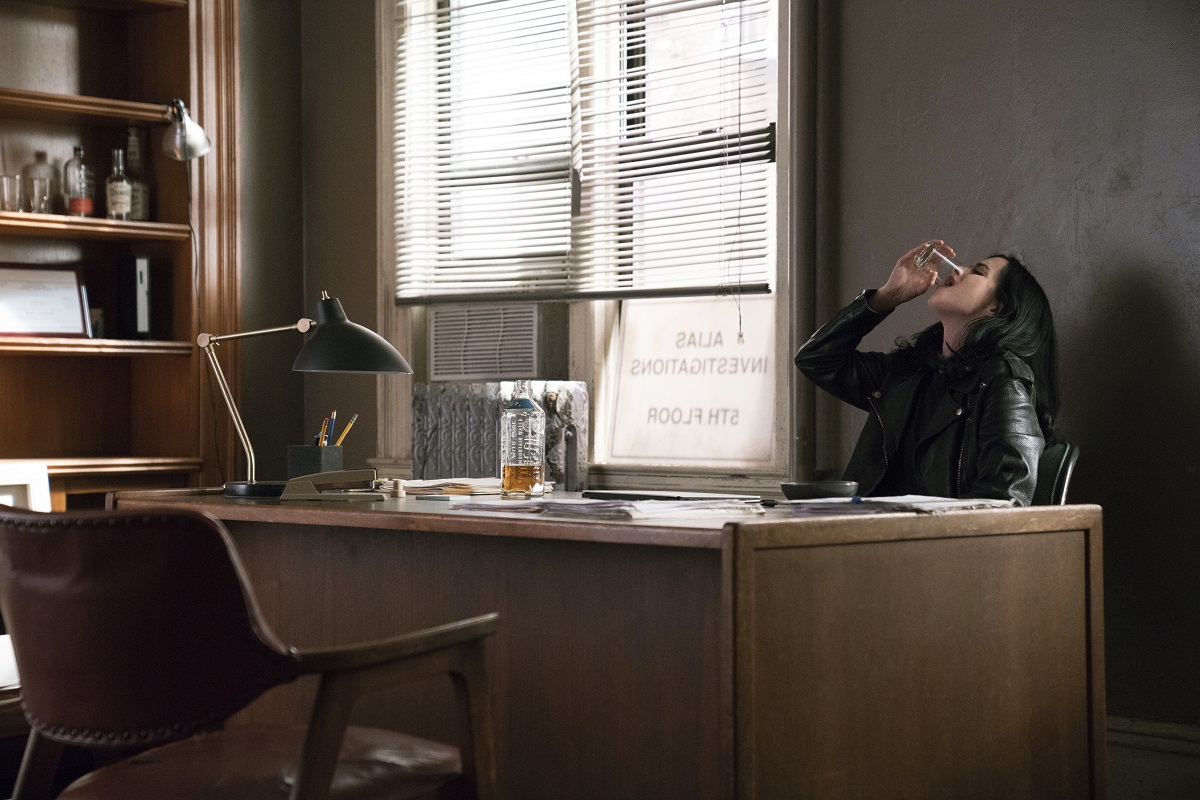Jessica Jones Season 2 Review: Characters You Care About, and a Shadow Corporation You Don’t

[Warning: This article contains spoilers for the first season of Jessica Jones, which you really should have watched already.]
I was able to watch the first five episodes of Netflix and Marvel’s Jessica Jones Season Two, in advance of the series premiere on Netflix on March 8, 2018. So while I don’t know how the plot ends up, or whether the character arcs end satisfyingly, I can tell you what they’ve set up so far.
Lucky for us, these characters are as sharp, complicated, and powerful as ever. Krysten Ritter absolutely shines as Jessica, Rachael Taylor gets a wonderfully complex arc as Trish, and Jeri Hogarth goes through a real reckoning with her life. If you’re watching for these characters, you’re going to be so happy to come back to this world.
However, season two also makes the seemingly perennial Marvel Netflix mistake of pitting its characters against a shadowy corporation (in this case, the IGH group from season one). As we’ve seen with Iron Fist, The Defenders, and Daredevil‘s second season, these series really struggle when their villains are secretive corporations or societies. They haven’t figured out how to inject tension or mystery into the detective work that’s involved in hunting down such an adversary, and Jessica Jones is unfortunately no exception. Trish and Jessica’s pursuit of IGH lacks focus, and it creates a story and pacing problem. They often stumble upon their clues; we don’t often get to follow anyone’s train of thought or walk through the evidence with them. As a result, a lot of the IGH plot feels more like a series of random events than an unfolding mystery. I’m curious about Jessica’s history with IGH, but I’m never really dying to know.
This is particularly disappointing, given that Jessica is a private investigator; watching her do detective work should be a fun and fundamental part of the series. Plus, Kilgrave was such a world-class villain in season one: a selfish, vicious metaphor for patriarchal entitlement, played with gut-piercing menace by David Tennant. I know the series wasn’t likely to get that lucky again, but it stinks when a series that didn’t have a villain problem develops one.
Now. All that said, the emotional questions that underpin the IGH plot—how should we process trauma, how useful is reckoning with the past, how do you help people who don’t want to be helped, how do you aggressively pursue justice while still taking care of yourself—are incredibly compelling. The thematic and psychological work of this series is absolutely as poignant as ever, even if the crime-fighting elements are less so.
As the season opens, Jessica is clearly struggling after killing Kilgrave; people now see her as a vigilante killer, and that’s not who she wants to be. She’s lashing out and frightened of herself, of what she now knows she is capable of doing. “Super?” one her new adversaries sneers at her. “You’re the weakest human being I’ve ever met.” Jessica is now terrified that this is true.
As a result, she has no interest in delving into her past or confronting her trauma—but Trish does. “Maybe you can’t move past it without actually facing it,” Trish argues. Jessica, however, fears that facing it will make her worse. This conflict between them not only drives the plot, but it also gives us some beautiful character moments that deepen their existing dynamic. Trish, the therapy-loving, relationship-having success story, who seems to have conquered her traumas. Jessica, the therapy-averse, bury-my-pain screw up who can’t control her triggers because she doesn’t want to recognize them. We’re familiar with this framework, but the show also starts to play with it, showing us where Trish is still vulnerable and how Jessica’s blunt acceptance of her own shittiness can provide a strange strength.
Some of the minor characters from season one, like Malcolm, also get more screen time and development, and there are a few relatively well-integrated new characters, as well. The show uses them to ask questions about addiction, ambition, PTSD, anger, loss, loneliness, and all that other troubling, touchy-feely stuff that makes for such good television. Just as in the last season, the show desperately wants to know: How the hell can we get through this world intact and okay? That’s a more relevant question than ever in the Trump era.
In sum, this season feels less binge-worthy, thanks to its story and villain problems. But I still loved getting to reunite with these characters. This is still very much a series with something to say—about trauma, about women’s anger, and about trying to survive without losing the person you want to be. In the era of peak TV, when so many series are technically well-crafted but not necessarily showing up with something to say, that makes Jessica Jones so worth watching for me.
(Featured image: David Giesbrecht / Netflix)
Want more stories like this? Become a subscriber and support the site!
—The Mary Sue has a strict comment policy that forbids, but is not limited to, personal insults toward anyone, hate speech, and trolling.—
Have a tip we should know? tips@themarysue.com